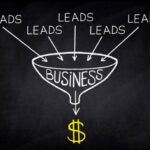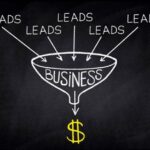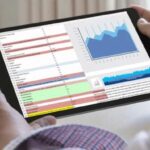
B2B Sales and the Role of Predictive Lead Scoring are critical aspects of modern marketing and sales strategies, especially in the context of B2B sales automation. In this digital age, businesses are constantly searching for ways to streamline their lead qualification process and maximize revenue generation.
Enter predictive lead scoring, a technique that utilizes machine learning algorithms for predictive analysis to identify the most promising leads and allocate resources accordingly. Targeted towards marketing and sales teams, this innovative approach assigns points to leads based on various attributes such as demographics, behaviour, and engagement. By implementing a robust lead scoring system, businesses can prioritize their efforts, optimize conversions, and ultimately boost their bottom line, particularly in the realm of B2B sales automation.
In the business world, B2B sales teams always look for new ways to make money and stay ahead of the competition. One such strategy that has revolutionized the way businesses approach lead generation is predictive lead scoring. Using data analytics, businesses can find and focus on good leads, resulting in more sales and better conversion rates.
In this blog post, we will examine these questions. We will also explore the numerous benefits of utilizing predictive lead scoring in your B2B sales automation process.
Understanding B2B Sales
Before we dive into the intricacies of predictive lead scoring, it’s crucial to have a solid grasp on B2B sales itself. Unlike traditional retail or direct-to-consumer models, B2B sales involve selling products or services from one business entity to another. This often entails longer buying cycles and multiple decision-makers who require thorough research before making a purchasing decision.
Challenges in B2B Sales
Longer sales cycles in the B2B market require persistence and patience. It takes time to build relationships, showcase value, and address concerns before a deal can close. Dealing with complex decision-making processes adds another layer of challenge. To close deals in B2B, it’s important to handle the different needs and preferences of multiple stakeholders effectively.
What is Predictive Lead Scoring?
Predictive lead scoring is a useful tool in B2B lead generation. It analyzes data and uses machine learning to find potential customers who are likely to make a purchase. By analyzing past customer behaviour, demographic information, and other relevant data points, predictive lead scoring helps businesses prioritize their leads and allocate resources more effectively. With this targeted approach, companies can increase conversion rates, optimize marketing efforts, and ultimately boost revenue.
Implementing predictive lead scoring in B2B lead generation offers several benefits. Firstly, it allows businesses to focus their time and resources on leads with the highest likelihood of converting into paying customers. This increases efficiency by reducing wasted effort on low-quality leads.
Additionally, predictive lead scoring enables businesses to personalize their marketing strategies for each individual lead based on predicted behaviours or preferences. This personalized approach enhances customer engagement and improves the overall effectiveness of marketing campaigns, contributing to successful B2B lead generation.
Definition and Purpose
Understanding predictive lead scoring is crucial in boosting B2B sales. Predictive lead scoring analyzes data and uses advanced algorithms and machine learning. It aims to find the most promising leads.
This approach differs from traditional lead scoring, which relies on historical data and predefined criteria. Data analytics helps businesses learn about their audience, make better decisions, and increase conversion rates.
- Predictive lead scoring utilizes advanced algorithms and machine learning.
- Traditional lead scoring relies on historical data and predefined criteria.
- Data analytics enables businesses to gain valuable insights for better decision-making.
The Role of Predictive Lead Scoring
Introduction to predictive lead scoring techniques: Predictive lead scoring utilizes advanced algorithms and data analysis to predict the likelihood of a lead becoming a customer. Businesses can analyze the attributes and behaviours of leads to prioritize them. This analysis includes factors such as past purchases and engagement with marketing materials. By evaluating these factors, businesses can determine the potential of leads to close.
Benefits of using predictive lead scoring for prioritizing leads: Implementing predictive lead scoring enables businesses to focus their resources on high-value prospects. Sales teams can improve their efficiency and effectiveness by identifying leads that are more likely to convert. This allows them to allocate their time and efforts more wisely. As a result, conversion rates are likely to increase, leading to higher revenue.
Integration of predictive lead scoring with CRM systems: Integrating predictive lead scoring with Customer Relationship Management (CRM) systems streamlines the sales process. Sales reps receive real-time updates on lead scores through this integration. As a result, they always have the latest information when talking to potential customers. This synergy between predictive analytics and CRM enhances productivity while providing valuable insights into each stage of the sales pipeline.
Implementing Predictive Lead Scoring in B2B Sales
Data Collection and Analysis
To effectively identify relevant data sources, it is crucial to employ a comprehensive approach that includes both internal and external data. Internal sources: customer databases, CRM systems, and sales records.
Implementing data cleansing and normalization processes ensures the accuracy and consistency of the collected information. Businesses can use machine learning algorithms to analyze data. This analysis helps them predict future trends and make better decisions. Ultimately, these decisions improve their B2B sales strategies.
Building a Scoring Model
Defining key criteria for lead scoring is essential in building an effective scoring model. We can prioritize leads based on their likelihood to convert by looking at factors like demographics, engagement level, and company size.
Using historical data, we can adjust the model and predict potential customers accurately by assigning weights to different criteria. Testing and validating the scoring model ensures it meets our business goals and improves our sales process for maximum success.
Integration with CRM and Sales Process
- Adding predictive lead scoring to CRM systems helps sales teams focus on the best leads by providing data and insights.
- Automating lead assignments based on scores makes the sales process faster by giving leads to the right salespeople.
- Notifying the team in real-time about high-scoring leads helps them stay updated on valuable opportunities. This enables them to take quick follow-up actions.
Predictive Lead Scoring Best Practices
Predictive lead scoring helps B2B sales by prioritizing efforts on the most promising leads, making it a powerful tool. Accurate predictive models rely on effective data management, which collects and processes the right data inputs. Continuous model optimization is important for businesses to improve predictions and adjust to market changes. Aligning sales and marketing teams ensures they work together, maximizing the impact of predictive lead scoring on digital growth.
Effective Data Management
Effective Data Management plays a crucial role in maximizing the potential of B2B sales. Businesses can ensure the accuracy and currency of their leads by focusing on data quality and cleansing. This, in turn, enables more precise outreach.
Additionally, integrating and enriching data from various sources allows for a comprehensive view of prospects, facilitating better decision-making. Having a data governance framework is important for organizing and controlling data. This framework should provide guidelines and processes for managing data.
Continuous Model Optimization
Leveraging advanced machine learning algorithms, B2B Rocket constantly optimizes its models for predictive lead scoring. By regularly updating and retraining the models, we ensure that they stay relevant and accurate in identifying high-quality leads. Their team closely monitors the performance and accuracy of these models to make data-driven decisions that drive successful sales outreach.
Sales and Marketing Alignment
To make sure the sales and marketing teams work together well, we need to set common goals and ways to measure those goals. This will help them work together better and be more successful.
It’s important for them to talk to each other and share information quickly. This will help them work well together.
They should also work together to decide which potential customers are the best ones to focus on. By working together, they can make better decisions and increase the number of customers they get.
- Clearly define common goals
- Establish regular meetings or check-ins
- Foster open lines of communication
- Encourage knowledge sharing between sales and marketing
Benefits of Predictive Lead Scoring in B2B Sales
Improved Lead Quality
The use of data to find good leads is changing how businesses find customers. Companies can use technology to analyze information and determine which leads are likely to become paying customers. This saves time and money by targeting potential buyers, rather than wasting resources on uninterested individuals. This helps businesses make more sales and earn more money.
In a competitive market, businesses should prioritize quality leads over quantity. Companies can use past information to see who is likely to buy. This helps them spend their resources on people who are more likely to become customers.
Sales teams can do better by focusing on good opportunities and not wasting time on ones that won’t work.
By using data, companies can avoid getting leads that aren’t good quality. Their technology helps them find customers who are interested in what they’re selling.
Sales teams can spend less time on leads that won’t go anywhere and more time on customers who are actually interested. This makes the sales process more efficient and increases the chances of making a sale.
Increased Conversion Rates
- By targeting the right prospects at the right time, businesses can significantly increase their conversion rates. Predictive lead scoring helps companies find and prioritize leads likely to convert, so sales teams can focus on the best opportunities.
- Personalized and relevant communication with leads is crucial for boosting conversion rates in B2B sales. Predictive lead scoring helps businesses understand prospects better, so they can customize their messages and offerings. This leads to more engagement and conversions.
Time and Cost Savings
- Automating lead scoring process for efficiency
- Reducing the manual effort in qualifying and nurturing leads
- Allocating resources effectively to high-potential leads
Automating lead scoring saves time by eliminating manual evaluation. Predictive lead scoring ranks potential customers based on their chances of making a purchase. This helps sales teams focus on leads with the most potential and reduces costs.
Automating lead qualification and nurturing removes manual tasks in vetting prospects and engaging them throughout the buyer’s journey. Automated systems send personalized content to leads without constant human involvement. This maximizes productivity by allowing valuable resources to focus on more strategic activities. Allocating resources effectively to high-potential leads ensures sales teams invest their time where it matters most.
Predictive analytics tools help businesses find potential customers by analyzing past data and behavior patterns. Companies can increase their success rates by focusing on qualified opportunities and avoiding spreading their efforts thin across all prospects.
Conclusion
Predictive lead scoring is very important in B2B sales. It helps businesses find good leads and focus on selling to them. This method has advantages like higher conversion rates, shorter sales cycles, and better sales efficiency.
B2B Rocket helps businesses succeed by using accurate data and integrating existing systems for maximum effectiveness and smooth operations. Predictive lead scoring is a key component of sales automation, helping businesses make more money and stay ahead in the competitive B2B world.






